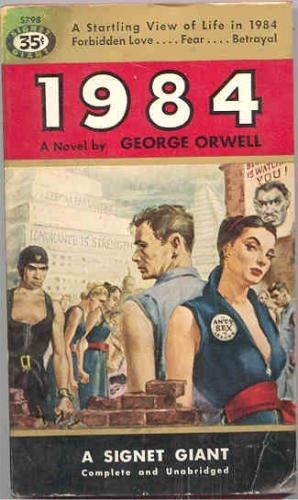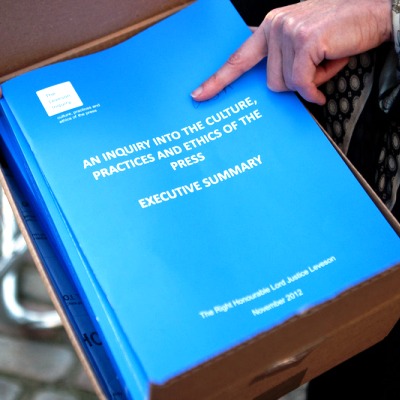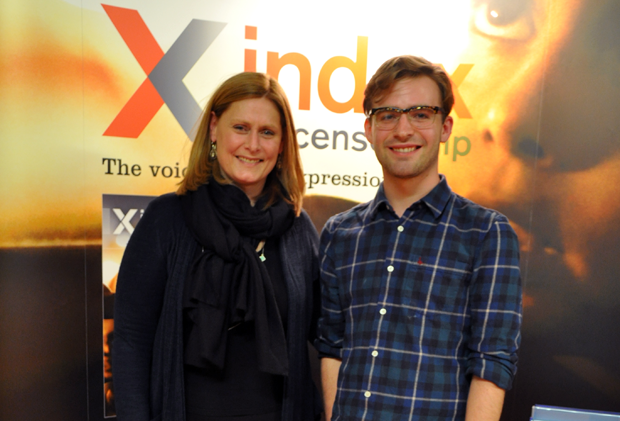21 Jan 2014 | Comment
George Orwell died on this day in 1950. This article, from Index on Censorship magazine (volume 42,no 3), looks at one legacy he may not have liked.
Subscribe to Index on Censorship magazine here
The revelation that US intelligence services have allegedly been monitoring everyone in the entire world all the time was good news for the estate of George Orwell, who guard the long-dead author’s copyright jealously.
Sales of his novel Nineteen Eighty-Four rocketed in the United States in June as Americans sought to find out more about the references to phrases such as “Big Brother” and “Orwellian” that littered discussions of the National Security Agency’s PRISM programme.
The Wall Street Journal even went so far as to describe this profoundly bleak novel as “one of the hottest beach reads this summer”. And web editors, hankering after a top ten Google ranking for their articles, quickly commissioned articles on the Orwellian theme.
Meanwhile, news website Business Insider published a plot synopsis that managed to run through the events of the book without describing what the book was about at all. The nadir of this frenzy was reached by an Associated Press correspondent, who wrote of his “Orwellian” experience of being stuck airside at the same Moscow airport as whistleblower Edward Snowden for a few hours (for added awfulness, an editor’s note on the piece suggested that this deliberate exercise in boredom was “surreal”).
Nineteen Eighty-Four (not 1984) has become the one-stop reference for anyone wishing to make a point. CCTV? Orwellian. Smoking ban? Big Brother-style laws. At the height of the British Labour Party’s perceived authoritarianism while in government, web libertarians squealed that “Nineteen Eighty-Four was a warning, not a manual”.
It was neither. It’s a combination of two things: a satire on Stalinism, and an expression of Orwell’s feeling that world war was now set to be the normal state of affairs forever more.

A brief plot summary, just in case you haven’t taken the WSJ’s advice on this summer’s hot read: Nineteen Eighty-Four tells the story of an England ruled by the Party, which professes to follow Ingsoc (English Socialism). Winston Smith, a minor party member, thinks he can question the totalitarian party. He can’t, and is destroyed.
While Orwell was certainly not a pacifist, descriptions of the crushing terror of war, and the fear of war, run through much of his work. In 1944, writing about German V2 rockets in the Tribune, he notes: “[W]hat depresses me about these things is the way they set people off talking about the next war … But if you ask who will be fighting whom when this universally expected war breaks out, you get no clear answer. It is just war in the abstract.”
It’s hard for us to imagine now, but Orwell was writing in a world in which the Universal Declaration of Human Rights was not yet formulated, and where the Soviet Union seemed unstoppable. Orwell had long been sceptical of Soviet socialism, and for his publisher Frederic Warburg Nineteen Eighty-Four represented “a final breach between Orwell and Socialism, not the socialism of equality and human brotherhood which clearly Orwell no longer expects from socialist parties, but the socialism of Marxism and the managerial revolution”. Warburg speculated that the book would be worth “a cool million votes to the Conservative party”.
This is the context in which Nineteen Eighty-Four was written, and the context that should be remembered by anyone who reads it.
But too often it is imagined there is a “lesson” in Nineteen Eighty-Four as, drearily, it seems there must be a lesson in all books. There is not. The brutality of Stalinism was hardly a surprise to anyone by 1949. The surveillance, the spying, the censorship and manipulation of history were nothing new. Orwell was not so much warning that these things could happen as convinced that they would happen more. He offers no way out, no redemption for his characters. If this book were to have a lesson, Winston would prevail in his fight against the Party; or Winston would die in his struggle but inspire others. We would at least get far more detail on the rise of Ingsoc (the supposed secret book Winston is given, The Theory and Practice of Oligarchical Collectivism, goes some way in explaining how the Party rules, but doesn’t really explain why it rules). As it is, we get an appendix on the development of “Newspeak”, the Party’s successful project to destroy language and, by extension, thought. This addition is designed only to assure us that the Ingsoc system still thrives long after Winston has knocked back his last joyless Victory gin.
There is no system in the world today, with the possible exception of North Korea (which has barely changed since it was founded just after Nineteen Eighty-Four was published), that can genuinely be said to be “Orwellian”. That is not to say that authoritarian states do not exist, or that electronic surveillance is not a problem. But to shout “Big Brother” at each moment the state intrudes on private life, or attempts to stifle free speech, is to rob the words, ideas and images created by Orwell of their true meaning – the very thing Orwell’s Ingsoc party sets out to do.
This article was posted on 21 January 2014 at indexoncensorship.org
3 Jan 2014 | News, Politics and Society, Religion and Culture
At its core, freedom of religion or belief requires freedom of expression. Both fundamental rights are protected in the Universal Declaration of Human Rights, yet nearly half of all countries penalize blasphemy, apostasy or defamation of religion. In 13 countries, atheists can be put to death for their lack of belief.
The U.S. State Department names and shames eight “Countries of Particular Concern” that severely violate religious freedom rights within their borders. These countries not only suppress religious expression, they systematically torture and detain people who cross political and social red lines around faith. The worst of the worst are:
1. Burma
Burma’s population is 90 percent Theravada Buddhist, a faith the government embraces and promotes over Christianity, Islam and Hinduism. Minority populations that adhere to these and other faiths are denied building permits, banned from proselytizing and pressured to convert to the majority faith. Religious groups must register with the government, and Burmese citizens must list their faith on official documents. Burma’s constitution provides for limited religious freedom, but individual laws and government officials actively restrict it. Most at risk in Burma are Rohingya Muslims, 240 of whom were killed this year in clashes with Buddhist mobs. Burma has refused to grant citizenship to 800,000 Rohingya, 240,000 of whom have fled their homes in recent clashes.
2. China
The ruling Chinese Communist Party is officially an atheist organisation. China’s constitution provides for freedom of religious belief, but the government actively restricts any religious expression that could potentially undermine its authority. Only five religious groups — Buddhists, Taoists, Muslims, Catholics and Protestants — can register with the government and legally hold services. Adherents of unregistered faiths and folk religions often worship illegally and in secret. Uighur Muslims, Tibetan Buddhists and Falun Gong practitioners have faced particularly severe repression in recent years, including forced conversion, torture and imprisonment.
3. Eritrea
The Eritrean government only recognizes four religious groups: the Eritrean Orthodox Church, Sunni Islam, the Roman Catholic Church, and the Evangelical Lutheran Church of Eritrea. These groups enjoy limited religious freedom while adherents of other faiths face harassment and imprisonment. Religious persecution in Eritrea is generally driven by government rather than social concerns. Jehovah’s Witnesses and other conscientious objectors who refuse to enroll in compulsory military training are subject to physical abuse, detention and hard labour. People of non-recognized religions are barred from congregating in disused houses of worship and have trouble obtaining passports or visas to exit the country.
4. Iran
Iran’s constitution offers some religious freedom rights for recognized sects of Islam along with Christians, Jews and Zoroastrians. Baha’is, who the government considers apostates and labels a “political sect,” are excluded from these limited protections and are systematically discriminated against through gozinesh provisions, which limit their access to employment, education and housing. Evangelical Christians and other faith groups face persecution for violating bans on proselytizing. Religious minorities have been charged in recent years and imprisoned in harsh conditions for committing “enmity against God” and spreading “anti-Islamic propaganda.” Government-controlled media regularly attack Baha’is, Jews and other minority faiths to amplify social hostilities against them.
5. North Korea
North Korea’s constitution guarantees religious freedom, but this right is far from upheld. The state is officially atheist. Author John Sweeney says the country is “seized by a political religion” and that it considers established religious traditions a threat to state unity and control. North Korea allow for government-sponsored Christian and Buddhist religious organizations to operate and build houses of worship, but political analysts suspect this “concession” is for the sake of external propaganda. A Christian group says it dropped 50,000 Bibles over North Korea over the past year. If caught with one, citizens face imprisonment, torture or even death. Given the government’s extreme control over the flow of reliable information, it is difficult to determine the true extent of religious persecution in North Korea.
6. Saudi Arabia
Saudi Arabia’s constitution is not a standalone document. It is comprised of the Quran and sayings of the Prophet Muhammad, which do not include religious freedom guarantees as spelled out in Article 18 of the Universal Declaration of Human Rights. In Saudi, it is illegal to publicly practice any faith other than the state’s official religion Sunni Islam. Members of other faiths can worship privately, but non-Muslim houses of worship may not be built. The Committee for the Promotion of Virtue and Prevention of Vice, otherwise known as Saudi’s morality or religious police, enforce Shariah law on the streets. Apostasy and blasphemy against Sunni Islam can be punished by death, as several high-profile Twitter cases have reminded global media in recent years.
7. Sudan
Sudan’s interim constitution partially protects religious freedom but restricts apostasy, blasphemy and defamation of Islam. Muslim women are also prevented from marrying non-Muslim men. The country’s vaguely worded apostasy law discourages proselytizing of non-Muslim faiths. Christian South Sudanese living in Sudan are subject to harassment and intimidation by government agents and society at large, but untangling the religious and ethnic motivations for this persecution can be difficult. Muslims generally enjoy social, legal and economic privileges denied to the Christian minority population. Government authorities have reportedly destroyed churches in recent years, and Christian groups have reportedly been subject to disproportionate taxes and delays in building new houses of worship. Read more about Sudan’s crackdown on Christians.
8. Uzbekistan
Proselytizing is prohibited in Uzbekistan, and religious groups must undergo a burdensome registration process with the government to enjoy what limited religious freedom is permitted in the country. More than 2,000 religious groups have registered with the government, the vast majority of which are Muslim but also include Jewish, Catholic and other Christian communities. Registered and unregistered groups are sometimes subject to raids, during which holy books have been destroyed. Individuals and groups deemed “extremist,” often for national security concerns rather than specific aspects of their faith, are imprisoned under harsh conditions and tortured, sometimes to death.
24 Oct 2013 | Media Freedom, News
This is a crosspost from WAN/IFRA
COMMONWEALTH PRESS UNION MEDIA TRUST, London, UK
FIPP – THE WORLDWIDE MAGAZINE MEDIA ASSOCIATION, London, UK
INTER AMERICAN PRESS ASSOCIATION, Miami, USA
INTERNATIONAL ASSOCIATION OF BROADCASTING, Montevideo, Uruguay
INTERNATIONAL PRESS INSTITUTE, Vienna, Austria
WORLD ASSOCIATION OF NEWSPAPERS & NEWS PUBLISHERS, WAN-IFRA, Paris, France; Darmstadt, Germany
WORLD PRESS FREEDOM COMMITTEE, Paris, France; Washington DC, USA.
Your Majesty
For more than three centuries since Britain abolished the last set of statutory controls on the press in 1695, the United Kingdom has been a consistent champion of the most crucial freedom of all – freedom of expression – and a beacon of liberty across the world.
Freedom of expression was central to the European Convention of Human Rights which Britain helped draft. It is part of the Universal Declaration of Human Rights to which the UK is a signatory. It is a core belief in the Commonwealth Charter which Britain inspired. Free speech and freedom of expression have throughout the 20th and 21st centuries therefore been at the core of Britain’s international commitments, of its leadership of the free world, and of its international reputation as a liberal democracy.
Yet all that is now in danger. No one should be in any doubt that the proposed Royal Charter which politicians are forcing Your Majesty to sign is, despite the camouflage, in reality a set of repressive statutory controls being imposed on the press against its will. That should not be the function of a Royal Charter.
Some will argue that it is just intended to establish a body to oversee an independent regulator. But by laying down rules about how that regulator must work and how the ethical Codes that bind the press should be written this toxic Charter brings Parliament for the first time ever to the heart of the newsroom. It breaches the fundamental principle that politicians must never get involved in editorial content regulation. And it lays the foundation for fully fledged statutory controls.
That will have a chilling impact on journalism throughout the United Kingdom – from the biggest national newspapers to the smallest local and regional papers and magazines in the four nations of your country – weakening democracy as a result.
But far more important to us is the impact of your actions across the globe. The world still follows Britain in so many areas. If the UK moves to control the press through the force of law then it will have a terrifying knock-on effect throughout the Commonwealth and much of the developing world where Britain has a key leadership role. The fact that this is being done by Royal Charter – an instrument traditionally used to grant rights, not to curtail them – will make that infinitely worse because of the respect in which You personally, and the Crown institutionally, are held throughout the world.
The actions of Britain’s Parliament will be used as an excuse by those who want to muzzle the press in their own country and stifle the free flow of information – and there are many governments who would love to do so. And it is your name, Your Majesty, that will regrettably be taken in vain. “If it is good enough for the Queen, it is good enough for us.”
Already we have seen the chill winds of what is happening in the UK in South Africa, Botswana and Sri Lanka. Many more will follow.
This issue is of huge importance for freedom of expression in the UK. It is important for Britain’s standing in the world. But above all it is important for the impact on countries not nearly so lucky as the many of us in Europe who until now have enjoyed fundamental freedoms.
At the Commonwealth Heads of Government meeting next month in Sri Lanka, the British Government – with The Prince of Wales as your representative – should be campaigning for the protection and expansion of free expression throughout the Commonwealth, not least in countries like Rwanda, Singapore and Sri Lanka itself, which persistently lag at the bottom of world press freedom indices alongside Syria and North Korea. Further, the British Government, which decriminalised defamation in 2009, should also take strong steps encouraging Commonwealth countries to repeal criminal defamation laws. But Britain will be in no position to do that if you have signed a Royal Charter which will be seized on by enemies of free speech everywhere eager to impose similar controls. Britain will have abrogated its rights and the world will be worse off for that.
We urge you, Ma’am, as the final guarantor of freedom of expression across the UK and your Commonwealth, not to sign this Charter.
Signed by the following members of the Coordinating Committee of Press Freedom Organisations:
COMMONWEALTH PRESS UNION MEDIA TRUST, London, UK;
FIPP – THE WORLDWIDE MAGAZINE MEDIA ASSOCIATION, London, UK;
INTER AMERICAN PRESS ASSOCIATION, Miami, USA;
INTERNATIONAL ASSOCIATION OF BROADCASTING, Montevideo,
Uruguay;
INTERNATIONAL PRESS INSTITUTE, Vienna, Austria;
WORLD ASSOCIATION OF NEWSPAPERS & NEWS PUBLISHERS,WAN-IFRA, Paris, France, Darmstadt, Germany;
WORLD PRESS FREEDOM COMMITTEE, Paris, France, Washington DC, USA.
16 Oct 2013 | About Index, United Kingdom

Sarah Brown and Charley-Kai John (Photo: Andrei Aliaksandrau/Index on Censorship)
Sarah Brown congratulated the winner of the first Index on Censorship student blogging competition on Tuesday after meeting at the launch of the autumn issue of the Index on Censorship magazine.
Charley-Kai John was invited to the event at Lilian Baylis Technology School in London where Brown spoke on the right for girls to have access to education.
The pair spent time discussing John’s plans for the future and his interests in freedom of expression.
The invite was part of the competition prize which also saw John’s blog, a look at internet access in North Korea, published in the magazine and online, as well as a yearly subscription to the magazine.
John is in his second year at the University of Warwick where he is studying English literature. He is also a keen cartoonist and creates images for The Boar, Warwick University’s online news publication, and The Student Journals. Entrants to the competition were asked to write about the biggest challenges to free expression in the world today.



